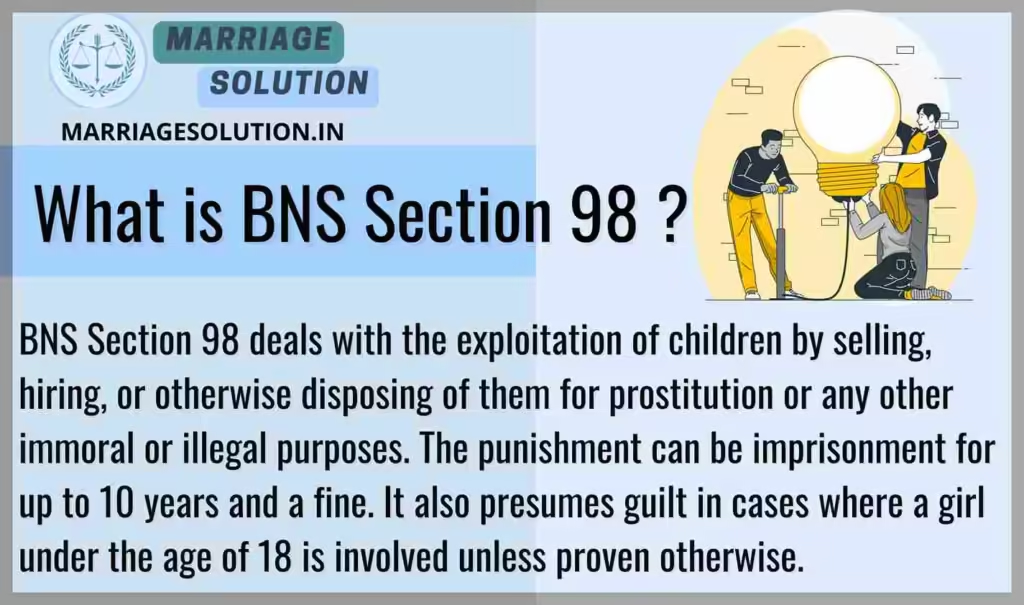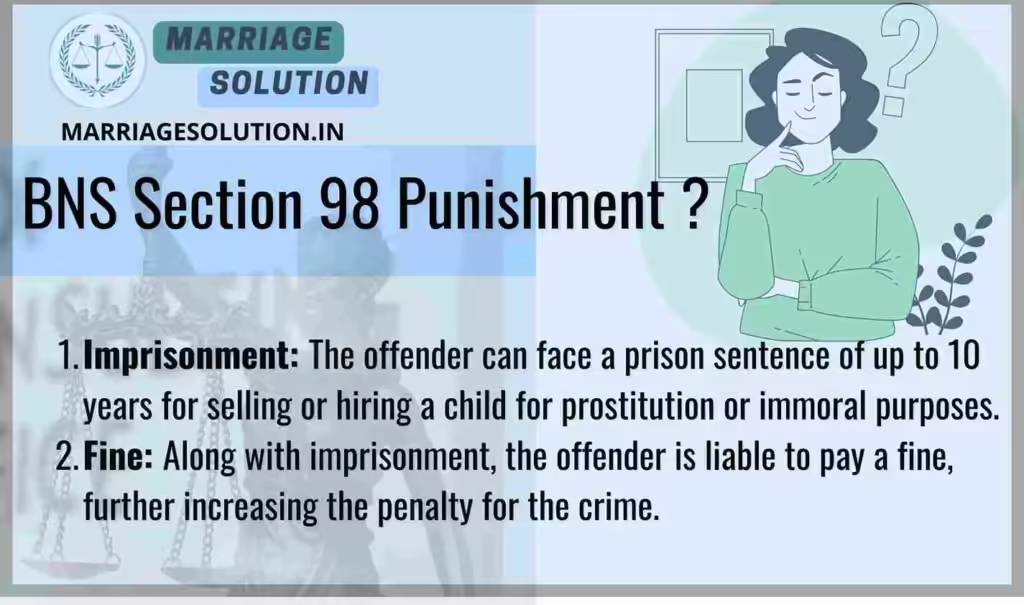Introduction of Section 98 BNS
Section 98 BNS is a law that protects children from being exploited for prostitution, immoral activities, or illicit intercourse. It lays out strict punishments for anyone who is involved in selling, hiring, or disposing of a child for these purposes. This law ensures that children, particularly girls under 18, are safeguarded against such heinous acts and that offenders are met with severe legal consequences.
The Bharatiya Nyaya Sanhita (BNS) Section 98 replaces the old Indian Penal Code (IPC) Section 372.
What is section 98 of BNS ?
BNS Section 98 deals with the exploitation of children by selling, hiring, or otherwise disposing of them for prostitution or any other immoral or illegal purposes. The punishment can be imprisonment for up to 10 years and a fine. It also presumes guilt in cases where a girl under the age of 18 is involved unless proven otherwise.

BNS Act 98
Whoever sells, lets to hire, or otherwise disposes of any person under the age of eighteen years with intent that such person shall be employed or used for the purpose of prostitution, or for any unlawful and immoral purpose, or knowing it to be likely that such person will be so employed or used, shall be punished with imprisonment which may extend to ten years, and shall also be liable to fine.
Explanation:
When a female under the age of eighteen years is sold, let to hire, or otherwise disposed of to a prostitute or to any person who keeps or manages a brothel, the person disposing of such female shall, until the contrary is proved, be presumed to have disposed of her with intent that she shall be used for the purpose of prostitution.”
- Who can be punished?
Anyone—parent, guardian, relative, trafficker, broker, or stranger—who is directly or indirectly involved in selling, hiring, or transferring a child under 18 for exploitation. - Age Limit
The law protects all minors under 18 years. Unlike earlier IPC provisions that mostly mentioned “girls,” Section 98 of BNS makes it gender-neutral—covering both boys and girls. - What actions are covered?
- Selling a child for money or benefits
- Hiring a child for immoral use
- Disposing of a child in any manner where exploitation is intended or likely
- Key Element – Intent or Knowledge
- The person must either intend that the child will be used for prostitution or immoral purposes, OR
- They must know that it is likely the child will be exploited.
Even if the seller claims ignorance, if it is proved they “knew” the risk, they are guilty.
- Special Presumption for Girls Under 18
If a girl under 18 is sold or transferred to a prostitute or to someone who manages a brothel, the law automatically presumes it was for prostitution—unless the accused can prove otherwise. This shifts the burden of proof onto the offender. - Definition of “Illicit Intercourse”
The law clarifies that illicit intercourse means sexual relations outside marriage or legal union. Any commercial sexual exploitation of children falls under this. - Punishment
- Imprisonment up to 10 years
- Fine (amount decided by the court)
- Both imprisonment + fine
The sentence reflects the gravity of child trafficking and exploitation.
- Why this law is important
This provision is designed to fight child trafficking and sexual exploitation. By making intent presumed in some cases (girls under 18 sent to brothels), it prevents offenders from escaping on technicalities.
Legal Nature of the Offense
Cognizable – Police can arrest without a warrant.
- Non-bailable – Bail is not a right; court decides.
- Non-compoundable – The case cannot be settled privately.
- Triable by Court of Session – Only higher criminal courts handle such serious offenses.
Illustrations (Examples)
Example 4 (Not an Offense): A couple legally adopts a 12-year-old child following proper procedures for education and care. Since there is no intent of exploitation, it is not covered under Section 98.
Example 1 (Offense): A trafficker sells a 16-year-old boy to work in a place known for sexual exploitation. He is guilty under Section 98.
Example 2 (Offense – Presumption): A 17-year-old girl is sold to a brothel owner. The law presumes it was for prostitution, and the offender must prove otherwise.
Example 3 (Offense): A woman “hires” a 15-year-old child for pornography production. This is exploitation under Section 98.
Section 98 BNS Overview
BNS Section 98 criminalizes the act of selling or hiring a child for purposes related to prostitution or any unlawful and immoral activities. It also addresses cases where the person selling the child knows that the child might be used for such purposes. The law imposes penalties, including imprisonment of up to 10 years and a fine. This section prioritizes the protection of children from being exploited for immoral activities.
Section 98 BNS 10 Key Points
1. Child Protection Law
The main purpose of Section 98 is to protect children under the age of 18 from being misused or exploited. It makes it a crime for anyone to sell, hire, or transfer a child for prostitution or for any immoral activity. This ensures that children are not treated as goods or property, but as human beings who have rights and dignity. The law strongly stands against anyone trying to use children for illegal or exploitative purposes.
2. Includes All Forms of Exploitation
This section is not limited to prostitution alone. It also covers all other forms of child exploitation, such as child pornography, sexual trafficking, or forcing a child into sexual labor. This wide coverage is important because offenders often try to misuse loopholes in the law. Section 98 closes these gaps by making all exploitative activities involving children illegal.
3. Harsh Punishment
The punishment for offenders under this law is very strict. They can face imprisonment of up to 10 years. Along with jail time, the court can also impose a fine, either separately or in addition to imprisonment. This shows that the law views crimes against children as one of the most serious offenses and gives no room for leniency.
4. Special Attention to Females Under 18
Section 98 gives extra protection to minor girls under the age of 18. If a girl is sold, hired, or transferred to a brothel or similar place, the law automatically assumes that it was for prostitution. This special rule ensures that traffickers cannot escape punishment by making false claims, such as saying they did not know the girl was being used for prostitution.
5. Presumption of Guilt
In cases involving minor girls under 18, the burden of proof is shifted to the accused. This means that the court will presume the offender is guilty unless they can prove otherwise. Normally, in criminal law, the burden is on the prosecution to prove guilt, but here the law makes an exception to strengthen child protection. This makes it easier to prosecute offenders and stop child exploitation.
6. Cognizable Offense
The crime under Section 98 is cognizable, meaning police officers can arrest the offender immediately without waiting for a court warrant. This is very important in trafficking cases, where any delay can cause more harm to the child. Quick action helps in rescuing children from dangerous situations.
7. Non-Bailable
This offense is non-bailable, which means the accused cannot demand bail as a matter of right. Only the court can decide whether bail should be given. In most cases, traffickers are kept in custody during the investigation. This prevents them from threatening witnesses, influencing the victim’s family, or running away.
8. Non-Compoundable
The offense is non-compoundable, which means it cannot be settled privately between the accused and the victim’s family. The case must go through proper legal proceedings in court. This rule is very important because traffickers often try to escape punishment by offering money or using pressure on poor families. The law ensures that justice cannot be bypassed.
9. Court of Session Trial
Cases under Section 98 are heard in the Court of Session, which is a higher court, not in a lower magistrate court. This shows the seriousness of the offense and ensures that the trial is handled under strict legal supervision. Courts of Session also have more powers to give higher punishments like 10 years imprisonment.
10. Explanation of “Illicit Intercourse”
The law clearly defines illicit intercourse to prevent any misuse of words. It means sexual relations between people who are not legally married or united. Any commercial sexual activity involving a child falls under this definition. This ensures that offenders cannot hide behind excuses like “consent” or “informal relationships.” For children, consent is irrelevant because the law always protects them.
BNS 98 Punishment
Imprisonment: The offender can face a prison sentence of up to 10 years for selling or hiring a child for prostitution or immoral purposes.
Fine: Along with imprisonment, the offender is liable to pay a fine, further increasing the penalty for the crime.

Section 98 bns bailable or not ?
No, BNS Section 98 is a non-bailable offense due to its severe nature. This means the accused will find it very difficult to get bail and will most likely remain in custody until the trial is complete.
Comparison: BNS Section 98 vs IPC Section 372
| Section | Offense | Punishment | Cognizable? | Bailable? | By What Court Triable |
|---|---|---|---|---|---|
| BNS Section 98 | Selling, letting, hiring, or otherwise disposing of a person under 18 years of age for prostitution, illicit intercourse, or any unlawful purpose. | Imprisonment up to 10 years and fine. | Cognizable | Non-Bailable | Court of Session |
| IPC Section 372 (Old) | Selling, letting to hire, or otherwise disposing of a minor (under 18 years) for prostitution, illicit intercourse, or any unlawful purpose. | Imprisonment up to 10 years and fine. | Cognizable | Non-Bailable | Court of Session |
Conclusion
Section 98 of the Bharatiya Nyaya Sanhita is one of the strongest child protection provisions in Indian law. By criminalizing the sale, hire, or disposal of children for prostitution and immoral activities, it directly targets traffickers and exploiters. The presumption of guilt for cases involving minor girls ensures that offenders cannot escape on technical grounds. With imprisonment up to 10 years, non-bailable status, and trial in the Court of Session, this section sends a strong message that child exploitation will never be tolerated.
Need Legal Support?
If you’re facing court proceedings, marriage-related issues, or any legal matter, our team at Marriage Solution – Lawyer Help is ready to guide you. Just complete our easy online enquiry form, and we’ll connect you with the right legal assistance tailored to your needs.
BNS Section 98 FAQs
What is BNS Section 98?
It criminalizes the sale or hiring of children for prostitution or immoral purposes.
What is the punishment under BNS Section 98?
Imprisonment for up to 10 years and a fine.
Is BNS Section 98 bailable?
No, it is a non-bailable offense.
Who tries the cases under BNS Section 98?
The Court of Session, as it is a serious offense.
Finished with BNS 98 ? Continue exploring the next provisions of the Bharatiya Nyaya Sanhita (BNS), 2023. Each section includes explanations, examples, and plain-language breakdowns for easy understanding.
- Section 99 BNS : Buying child for purposes of prostitution, etc .
- https://marriagesolution.in/bns_section/section-99-bns/
- BNS 100 : Culpable homicide .
- https://marriagesolution.in/bns_section/bns-100/
- BNS 101: Murder .
- https://marriagesolution.in/bns_section/bns-101/
- BNS 102 : Culpable homicide by causing death of person other than person whose death was intended.
- https://marriagesolution.in/bns_section/bns-102/
- BNS 103 : Punishment for murder .
- https://marriagesolution.in/bns_section/bns-103/
Full IPC Section List: https://marriagesolution.in/ipc-section-list
All Indian Law & Blogs: https://marriagesolution.in/indian-law/
Full BNSS Section List: https://marriagesolution.in/bnss_section-list
